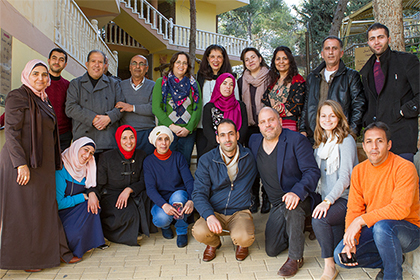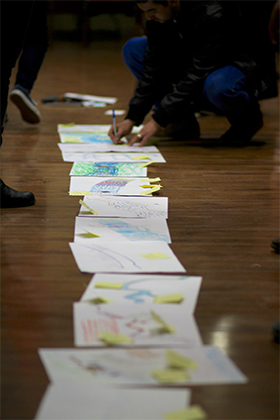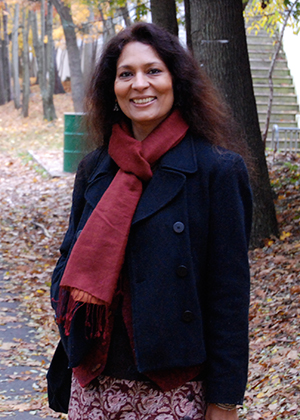“When we are all dirty, we don’t see the dirt on each of us.”

The group gathered in a quiet place near Bethlehem. “For most of
them, this was the first time they had the opportunity for such
expression,” said Dr. Chhabra.
That’s how one individual described a life surrounded by everyday violence in the West Bank, which he shared with a group of fellow educators from Palestine during an intensive residency conducted by Associate Professor Meenakshi Chhabra.
Dr. Chhabra, who teaches in the Global Interdisciplinary Studies program, traveled to the West Bank in January to run the weeklong workshop on trauma awareness and resilience with a group of 18 educators.
“They shared their own experiences, about the violence surrounding their everyday lives and the ways in which the Occupation wears on them,” Chhabra recalled. “For most of them, this was the first time they had the opportunity for such expression.”
The group gathered in a quiet place near Bethlehem, and participants worked both in larger groups and one-on-one to process their experiences.
“At first they spoke about how tired they were from their work and the day-to-day pressures of life,” said Chhabra.
Reticent and reserved at first, the group quickly bonded and opened up.
“For most of them, this was the first time they had the opportunity for such expression,” she said.
Even for educators, trauma becomes normalized
The educators were from Palestinian public schools and schools for Palestinian refugees run by the United Nations Relief and Works Agency (UNRWA). Participants ranged from school principals, counselors and veteran teachers, to teachers who had just started their career.

Participants used the arts, dialog, breathing
exercises and listening to process the impact
of trauma on learning and to devise strategies.
Over the course of the residency and the process of the workshops, participants realized the impact that living in intense conflict contexts has on their students, colleagues, friends and family.
“One participant explained that he and others in the community usually take the trauma experienced in their daily life in the West Bank as a norm,” Chhabra recalled. “ ‘It’s what we all suffer, so we don’t talk about it,’ he said.”
Participants became immersed in the interactive experience – using the arts, dialog, breathing exercises and listening – to create a unique opportunity.
“The educators experienced concepts and practices related to trauma and resilience that they could adapt to their school and classroom contexts,” said Chhabra. “The discussions included culturally appropriate supportive classroom pedagogies, self and community care.”
Strategies for Trauma Awareness and Resilience
Chhabra, who is also a Lesley alumna, is a two-time Fulbright scholar, as well as a Fulbright Specialist in Peace and Conflict Studies. She has dedicated her career to building relationships between cultures in conflict, including Indian and Pakistani youth and adults, through education, research and advocacy.
She based the recent workshop in Palestine on the Strategies for Trauma Awareness and Resilience (STAR) program, for which she is a trainer.
The participants used the Lesley Institute for Trauma Sensitivity (LIfTS) checklist for trauma-informed schools to provide guidelines that were appropriate for their schools and classrooms, such as:
- Daily morning check-ins
- Keeping a routine
- Personal contact with parents and caregivers
- Inviting larger community participation in classroom activities
- Teacher socials
Participants developed a plan to share with their colleagues at their schools and inform others about the impact of trauma on learning.
“There was an agreement among the educators that they may not be able to influence the larger conflict, but they could influence how they respond to it, and how they support their students and those around them,” said Chhabra.
Amid the trauma, finding inspiring ‘voices of hope’
Following the daily workshops, the participants enjoyed dinner together and often continued their conversations late into the night.

Says professor Chhabra (pictured):
“There was an agreement among the educators
that they may not be able to influence the larger
conflict, but they could influence how they
respond to it, and how they support their
students and those around them.”
“In addition to the serious discussions, tears and substantial and meaningful learning, there was also laughter and fun, and time to relax and blow bubbles while practicing deep breathing,” recalled Chhabra.
The group took a field trip to Bethlehem during the residency.
“One of the educators from a nearby town proudly shared with us highlights of the birthplace of Jesus, as well as the bold murals on the ‘wall,’ which locks in the inhabitants of the city from the world outside,” said Chhabra.
She reflected, “While giving a glimpse of the traumas they faced, the educators’ personal experiences spoke to their resilience and their unflinching commitment to their students. It was encouraging to witness the older generation of educators inspiring the next generation with their personal narrative of patience and perseverance. In the midst of the relentless challenges that these educators experience, it was surreal but also heartening to hear their voices of hope.”
The project was a collaboration with Seeds of Peace, a non-profit organization that works with youth and educators from countries in conflict.